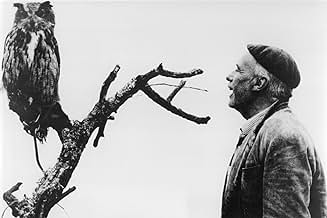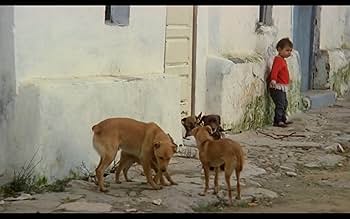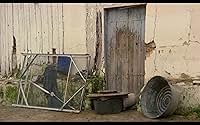VALUTAZIONE IMDb
8,1/10
5107
LA TUA VALUTAZIONE
Aggiungi una trama nella tua linguaSpain, 1960s. The family of poor farmers work hard in the countryside for the rich landowners who exploit them.Spain, 1960s. The family of poor farmers work hard in the countryside for the rich landowners who exploit them.Spain, 1960s. The family of poor farmers work hard in the countryside for the rich landowners who exploit them.
- Regia
- Sceneggiatura
- Star
- Premi
- 6 vittorie e 4 candidature totali
Pepín Salvador
- Obispo
- (as José Salvador)
Recensioni in evidenza
This the fourth Spanish language film recommended to me as essential viewing by my next-door Spanish neighbours and another excellent choice it is too.
I'm not familiar with the source novel but understand that the setting here is early 60's rural Spain, with the country very much in the Franco dictatorial era which lasted until the mid-70's when democracy and the constitutional monarchy were restored. I'm from the United Kingdom where we probably like every other developed country think we know something of the class struggle but I was staggered at the gap represented here between rich and poor in a recognisably modern context.
We're immediately introduced to the key character of Francisco Rabal's Azarias character, a big unkempt man who although he might be slow mentally nevertheless has an affinity with nature and a particular talent for befriending and petting birds. He also however has no concept of good manners or acceptable behaviour as we easily gauge from his twin habits of defecating in public places and urinating on his hands to stop them, as he says, from chapping. When he loses his position at a wealthy family he joins up with his married sister, her husband and their three children, who are likewise at the lowest end of the social scale.
The family live a life of hardship and drudgery, the husband employed as his selfish draconian, well-to-do master's underling and who has a special skill for beating out game birds for his blood-sport loving boss to shoot by the dozen. His wife helps about the big house, while of their three children, the oldest is keen to escape this life of serfdom and join the army, their middle daughter looks like she will follow her mother into service although there's an inference that she might well be corrupted before she's much older by some rich boor who will treat her as available and willing. Lastly, the couple have a desperately sick younger daughter who is always being carried around and who frequently cries out in pain. At no stage does anyone of the gentry show the slightest concern for this distressed child's obviously ailing health. This miserable family, now plus Azarias, try to eke out a pathetic existence living lives of virtual slavery, their accommodation, you couldn't call it a home, comprising a hovel lit by one bare light bulb. These people resemble nothing so much as Van Gogh's "The Potato Eaters" and yet they are required to accept their lives of grinding poverty as something to thank their monied benefactors.
As for the rich folk, we are permitted some insight into their shallow lives as they periodically arrange or attend grand banquets in the palatial grounds of their grand homes, salve their social consciences by giving their lowly servants the most rudimentary of educations or distributing some low-value coin to them from their position of exaltation. Unsurprisingly, they can also openly indulge in marital affairs, brazenly carrying these on in front of their mute staff witnesses.
It all comes to a head when the peasant husband accidentally falls out of a tree in the course of his duties as a beater, badly breaking his leg in the process. His callous master however has no care or concern for the acute pain the old man is suffering and pushes him to attend a prestigious big hunt he's organising for his fellow-bourgeoisie. Let's just say that while technically speaking the story ends in tragedy, in truth, the conclusion seems altogether almost satisfactory and deserved.
Shot in shades of grey and ochre, in a super-naturalistic style and acted in a hyper-realistic manner by the ensemble cast, its hard not to be reminded of the work of British director Ken Loach who certainly ploughs a similar field. It can't be a coincidence that Azaria bonds with a kite the way the same way the young boy does with his pet kestrel in Loach's "Kes".
It is a slow, arid and at times depressing film. There is some cross-cutting with the timeline by the director which I found slightly confusing at times but the itruth here appears to be that While I understand that the system in rural Spain was widespread well into the 70's, one would like to think that not all master and servant relationships were as stark and brutal as depicted here.
Modern day slavery is unfortunately still happening around the world over as evidenced by stories which occasionally but continually surface on the news. That it seemed to be rife in Spain as late as the 60's is a savage indictment of the status quo in Spanish society.
My eyes were certainly opened by what I saw here. Consider it the disturbing, dark contrast to the French "Manon De Source" and "Jean De Florette" films of around the same time. And remember that the usury witnessed here still went on in Spain only 50 years or so ago.
I'm not familiar with the source novel but understand that the setting here is early 60's rural Spain, with the country very much in the Franco dictatorial era which lasted until the mid-70's when democracy and the constitutional monarchy were restored. I'm from the United Kingdom where we probably like every other developed country think we know something of the class struggle but I was staggered at the gap represented here between rich and poor in a recognisably modern context.
We're immediately introduced to the key character of Francisco Rabal's Azarias character, a big unkempt man who although he might be slow mentally nevertheless has an affinity with nature and a particular talent for befriending and petting birds. He also however has no concept of good manners or acceptable behaviour as we easily gauge from his twin habits of defecating in public places and urinating on his hands to stop them, as he says, from chapping. When he loses his position at a wealthy family he joins up with his married sister, her husband and their three children, who are likewise at the lowest end of the social scale.
The family live a life of hardship and drudgery, the husband employed as his selfish draconian, well-to-do master's underling and who has a special skill for beating out game birds for his blood-sport loving boss to shoot by the dozen. His wife helps about the big house, while of their three children, the oldest is keen to escape this life of serfdom and join the army, their middle daughter looks like she will follow her mother into service although there's an inference that she might well be corrupted before she's much older by some rich boor who will treat her as available and willing. Lastly, the couple have a desperately sick younger daughter who is always being carried around and who frequently cries out in pain. At no stage does anyone of the gentry show the slightest concern for this distressed child's obviously ailing health. This miserable family, now plus Azarias, try to eke out a pathetic existence living lives of virtual slavery, their accommodation, you couldn't call it a home, comprising a hovel lit by one bare light bulb. These people resemble nothing so much as Van Gogh's "The Potato Eaters" and yet they are required to accept their lives of grinding poverty as something to thank their monied benefactors.
As for the rich folk, we are permitted some insight into their shallow lives as they periodically arrange or attend grand banquets in the palatial grounds of their grand homes, salve their social consciences by giving their lowly servants the most rudimentary of educations or distributing some low-value coin to them from their position of exaltation. Unsurprisingly, they can also openly indulge in marital affairs, brazenly carrying these on in front of their mute staff witnesses.
It all comes to a head when the peasant husband accidentally falls out of a tree in the course of his duties as a beater, badly breaking his leg in the process. His callous master however has no care or concern for the acute pain the old man is suffering and pushes him to attend a prestigious big hunt he's organising for his fellow-bourgeoisie. Let's just say that while technically speaking the story ends in tragedy, in truth, the conclusion seems altogether almost satisfactory and deserved.
Shot in shades of grey and ochre, in a super-naturalistic style and acted in a hyper-realistic manner by the ensemble cast, its hard not to be reminded of the work of British director Ken Loach who certainly ploughs a similar field. It can't be a coincidence that Azaria bonds with a kite the way the same way the young boy does with his pet kestrel in Loach's "Kes".
It is a slow, arid and at times depressing film. There is some cross-cutting with the timeline by the director which I found slightly confusing at times but the itruth here appears to be that While I understand that the system in rural Spain was widespread well into the 70's, one would like to think that not all master and servant relationships were as stark and brutal as depicted here.
Modern day slavery is unfortunately still happening around the world over as evidenced by stories which occasionally but continually surface on the news. That it seemed to be rife in Spain as late as the 60's is a savage indictment of the status quo in Spanish society.
My eyes were certainly opened by what I saw here. Consider it the disturbing, dark contrast to the French "Manon De Source" and "Jean De Florette" films of around the same time. And remember that the usury witnessed here still went on in Spain only 50 years or so ago.
The last twenty five years of Spanish filmography have produced a number of titles which have indulged in sociological themes, mostly using the years of the Franco Régime as a background when not a mere scapegoat. El Sur (Victor Erice)(qv), Las Ratas (Giménez Rico)(qv), Las Bicicletas son para el Verano (Jaime Chávarri) as well as several by the now deceased Pilar Miró, come to mind. But perhaps none reach the powerful endorsement achieved in Los Santos Inocentes, carefully and predictably directed by Mario Camus. Faithfully transferred from the book by Miguel Delibes, also author of Las Ratas, as well as singularly impressive narratives such as Cinco Horas con Mario, a true tour de force in contemporary literature, and the intensely lyrical and moving El Camino, Camus inspired the principal actors - Paco Rabal, Alfredo Landa and Terele Pávez - into producing some memorable scenes.
Scenes of illiterate peasants obeying their master, landowner, insensible to everything except his passion for hunting; peasants who were so hugely grateful for the handful of pennies so compassionately handed out by the rich duchess; peasants who grovelled in the filth of their mean shack and could barely write their own names. Spain: about 1962 if the registration number of the big black Mercedes is anything to go by. Spain, in the region called Extremadura, which even today is the poorest part of the country. Spain, governed by a dictator who himself was extremely uncultured.
Camus, armed with the simple but sincere exposition in Delibes' novel, manages to show this plight, but without the tremendism so frequent in Spanish books or films; without any soured feelings, but dispassionately, like a surgeon operating for the five hundredth time on gall-stones. The story was there to be told and not sympathized over. Not for the pop-corn eating public, more for the discerning cinema-goer who can give what the film demands: attention to details. The incision is precise, exact, giving greater credibility to this little masterpiece.
Scenes of illiterate peasants obeying their master, landowner, insensible to everything except his passion for hunting; peasants who were so hugely grateful for the handful of pennies so compassionately handed out by the rich duchess; peasants who grovelled in the filth of their mean shack and could barely write their own names. Spain: about 1962 if the registration number of the big black Mercedes is anything to go by. Spain, in the region called Extremadura, which even today is the poorest part of the country. Spain, governed by a dictator who himself was extremely uncultured.
Camus, armed with the simple but sincere exposition in Delibes' novel, manages to show this plight, but without the tremendism so frequent in Spanish books or films; without any soured feelings, but dispassionately, like a surgeon operating for the five hundredth time on gall-stones. The story was there to be told and not sympathized over. Not for the pop-corn eating public, more for the discerning cinema-goer who can give what the film demands: attention to details. The incision is precise, exact, giving greater credibility to this little masterpiece.
10sukerman
In this film, you can see a important part of the recent history of my great country. This film is about the life in a big "cortijo" after civil war in 50-60´S, you can see the lives between rich people, like "señorito Ivan", and poor, like "Paco el Bajo", and how are the relations between this kind of people,they are near to the slavery. Besides, you can see poverty´s ravage, and the many different kind of familiar´s drama.
This is one of the best Spanish movies I have seen. For many reasons. First, the story, which is based on a great novel by the brilliant writer Miguel Delibes, can be seen from different points of view: as the characters in themselves, or as the history of the spanish society through two generations. Second, the actors do an incredible performance (Paco Rabal and Alfredo Landa are really fantastic, not to mention Juan Diego, Mary Carrillo, Terele Pávez...). Third, the scenes' directing and editing rise to the occasion. The result is a fresh, intelligent and charming film that we won't forget for a long time. Perhaps Belén Ballesteros and Juan Sachez's performances aren't worthy of the occasion, but that's the least of my worries.
10erwinoz
If I would believe in a god who created man as his equal, Mario Camus would be one of the first people to come in mind to make me understand how powerful that god must be. 'Los santos inocentes' is a masterpiece of European cinema. The movie brings us back to times in Spain where most people were nothing more than property of the few rich. The 'master' even had the right to be the one to make the daughters of his serfs lose their virginity. A man and wife living such a cruel life, with trouble enough of their own, still open up their house for the wife's brother Azarias (Francisco Rabal), when he -at old age- loses his job. And Rabal gives us a performance of simplicity and joy that we will never ever forget. Although I've heard of people who found it difficult to see the beauty through all the misery, to me this is one of the most beautiful movies I've ever seen. Possibly also the very best.
Lo sapevi?
- QuizVoted eighth best Spanish film by professionals and critics in 1996 Spanish cinema centenary.
- ConnessioniFeatured in ¡Qué grande es el cine!: Los santos inocentes (1996)
I più visti
Accedi per valutare e creare un elenco di titoli salvati per ottenere consigli personalizzati
- How long is The Holy Innocents?Powered by Alexa
Dettagli
- Data di uscita
- Paese di origine
- Sito ufficiale
- Lingua
- Celebre anche come
- The Holy Innocents
- Luoghi delle riprese
- Aziende produttrici
- Vedi altri crediti dell’azienda su IMDbPro
- Tempo di esecuzione
- 1h 47min(107 min)
- Colore
- Mix di suoni
- Proporzioni
- 1.66 : 1
- 1.78 : 1
Contribuisci a questa pagina
Suggerisci una modifica o aggiungi i contenuti mancanti

![Guarda Tráiler [OV]](https://m.media-amazon.com/images/M/MV5BMDA4ZTRjZjktOTJjYi00MGRlLWE3NDktYzgzNDAyYjk4NjY5XkEyXkFqcGdeQXRyYW5zY29kZS13b3JrZmxvdw@@._V1_QL75_UX500_CR0)





























